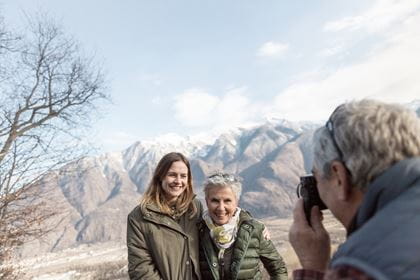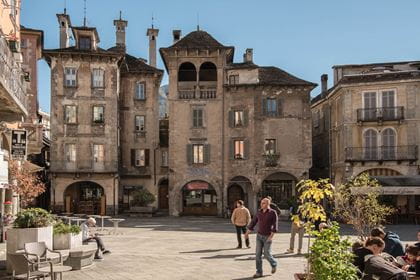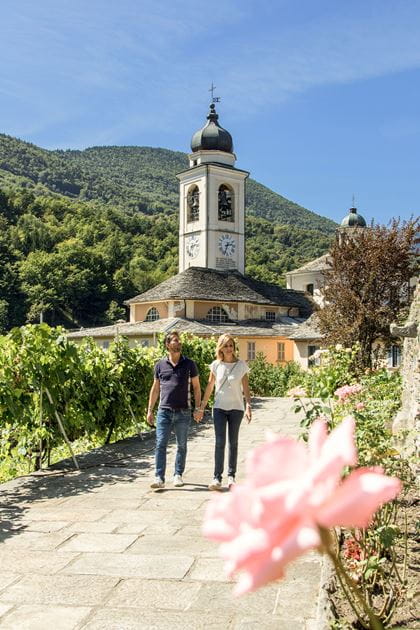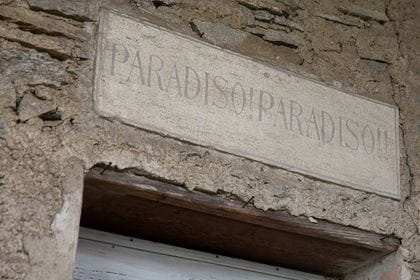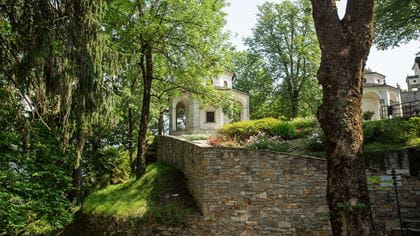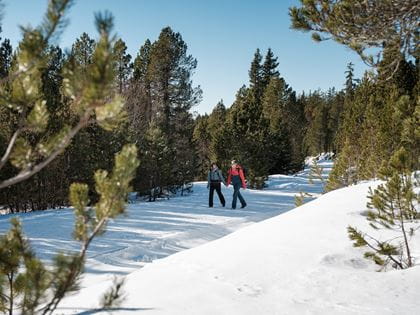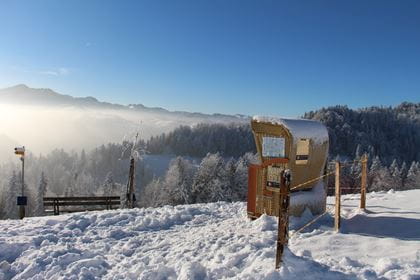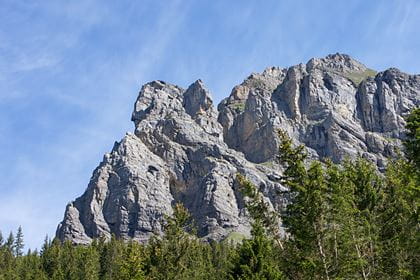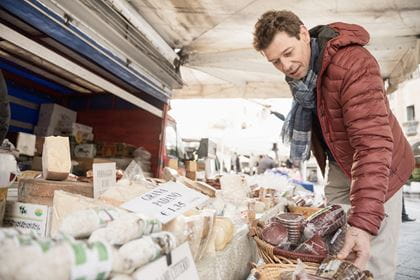Age verification
Sacro Monte Calvario in Domodossola
Hiking between nature and spirituality while enjoying Italian flair
Sacro Monte Calvario in Domodossola is one of the sites with the greatest religious, historic and scenic significance in the Piedmont region. The Sacri Monti (Holy Mountains) complex in the Alpine region, made a UNESCO World Heritage Site in 2003, is of great cultural interest, as well as being a place for peace, prayer and meditation.
With the RegioExpress Bern–Spiez–Kandersteg–Brig–Domodossola you travel comfortably from Bern direct to Domodossola.
Sacro Monte Calvario
Building work began in 1656 on the Colle di Mattarella hill, which still looks down on the city of Domodossola today. The main objective was to build a "processional path" on its slopes, a kind of "way of the cross" leading to a pilgrimage church, in which all believers would be welcome.
The impressive, atmospheric path is accessible on foot to this day, and starts in the centre of Domodossola, where, in 1658, the great Arco di Pilato (Pilatus Arch) was constructed, only to be demolished in 1875. You reach the top of the hill on a paved road through the middle of lush woodland. As you climb, you pass various stations that are organised architecturally in a progression of 15 chapels.
In 1828, the works and spirituality of the Sacro Monte Calvario received another boost thanks to the arrival of the theologian and philosopher Antonio Rosmini. The mother house of the Rosminians was built on the summit. It is still of fundamental significance to the Rosminians today, the structure being the domicile of the postulate and the international novitiate, as well as, most importantly, serving as an important spiritual centre. You can still visit Antonio Rosmini's cell in the Sacro Monte complex.
The special Sacro Monte Calvario di Domodossola nature reserve was set up in 1991 in order to protect the immense artistic, historic, architectural and scenic heritage of Sacro Monte. The medieval castle of Mattarella, the convent of the Rosminians, the oratorio of the Madonna delle Grazie, Santissimo Crocefisso pilgrimage church and the 15 chapels of the way of the cross are all deemed part of the complex.
In 2003, the UNESCO Committee entered 24 new places onto its list of World Heritage sites, including the Sacri Monti del Piemonte e della Lombardia, to which the Sacro Monte Calvario in Domodossola belongs. A visit to this place of such significance to the entire Ossola valley is essential. Faith, nature and art are housed in this precious shrine, which is just a stone's throw from the centre of Domodossola.
Hiking trail
Trail description
From the center of Domodossola, the Via Matterella leads to the outskirts of the city. After the first chapel, the path climbs steeply and passes through a sparse forest up to the Sacro Monte Calvario. A total of 15 chapels are located along the trail. Once at the top, a wonderful panoramic view of the city of Domodossola and the surrounding mountain peaks awaits you.
Key data
| Starting point | Domodossola |
| Duration | 30 minutes |
| Distance | 1.7 km |
| Level of difficulty | easy |
| Elevation difference | approx. 240 meters |
Equipment
Sturdy footwear is mandatory. It is recommended to wear trekking or mountain shoes with a good treaded sole.
Availability Today (Friday) open
The pilgrimage route is accessible all year round.
Sights and attractions
Pilgrimage Church of the Holy Cross (Santuario del Santissimo Crocifisso)
Shaped like an elongated octagon, the Santissimo Crocifisso pilgrimage church stands proud on the Sacro Monte Calvario rock in Domodossola, building work having started on it in 1657. In 1672, the dome with its lantern was constructed to be joined, in 1686, by the atrium protruding from the façade. The latter consists of a barrel vault and is supported by pillars and stone columns made of local serpentine stone. The vault contains paintings of angels with the Instruments of the Passion by Giovanni di Sampietro. Both the design and construction of the pilgrimage church are attributed to Tommaso Lazzaro, who was also entrusted with the construction of other religious structures in the Ossola valley. Apart from the gate and two small devotional windows, the façade lacks other openings: on entering the pilgrimage church, you notice immediately that most of the light comes from the dome, creating an atmosphere of profound devotion.
Botanic garden (Orto botanico)
The friars who lived on the Sacro Monte in Domodossola also owned land around the architectural complex, which was used for agricultural and horticultural purposes, including flower gardens. In terms of agriculture and horticulture, they primarily grew vines, fruit, forage crops and market garden produce. The Botanic Garden of Sacro Monte Calvario in Domodossola has a network of paths enabling you to view it: the individual plants are displayed according to a specific scientific system, which adds great botanic interest as you walk around.
The Botanic Garden of Sacro Monte Calvario is ideal for the cultivation of traditional crops and medicinal plants, including historically proven varieties from the gardens of the Ossola valley and others with symbolic/religious characteristics. The selection of this location reminds you of the hortus conclusus, the ancient walled vegetable gardens found at some religious sites.
Oratory of Mary Full of Grace (Oratorio della Madonna delle Grazie)
Outside the walls of the old castle of Mattarella, a chapel rose up alongside the mule-trail leading up the mountain, which was decorated by an unknown artist towards the end of the 16th century with a fresco depicting the Virgin Mary and Child. The chapel was devoted to Mary Full of Grace. Built in 1658, a small devotional chapel with a vault and stone floor at the end of the climb recalls her memory. In the same year, the bishop wanted to attach it to the Sacro Monte Calvario in Domodossola and later ordered its expansion, whilst preserving the ancient likeness of the Blessed Virgin. This solution proved difficult and in 1660 it was decided to build the oratory, which can be visited today.
The hill and Mattarella Castle (Il Colle e il Castello di Mattarella)
The hill of Mattarella to the south of Domodossola rises up to a height of 413 metres from the Ossola valley. The hill gives you magnificent views of Domodossola and the mountains surrounding the city in the Ossola valley. The hill, which was inhabited in ancient times, presumably got its name from a pagan site for older married women, in place of which a church dedicated to the Virgin Mary was erected at a later time.
The hill of Mattarella was occupied by military forces in the 7th century and was the site of a vast castle, which came under attack many times and was destroyed in the course of the centuries. In 1014, Kaiser Heinrich II gave the castle to the church in Novara, and then the Bishop of Novara and relocated his palace and the Curia there. In 1312, the Viscontis came into power in the Ossola valley: Mattarella Castle also passed into the ownership of the Duchy of Milan and maintained its functions, especially military ones, until 1415, when the Swiss came through the Alpine passes with the aim of capturing the Ossola valley, tearing it down almost entirely and simultaneously destroying the Bishop's Palace, enclosures and most important towers. After these dramatic events, there are only a few traces of the old stronghold visible nowadays: the tower on the mountain summit grandly rises up above it. The long curtain wall is also well preserved. Sadly, all that is left of the castle and the once sturdy towers at the entrance are a few foundations.
How to get there
With the RegioExpress Bern–Spiez–Kandersteg–Brig–Domodossola you travel comfortably from Bern direct to Domodossola. The pilgrimage route begins in the Via Matterella in the center of Domodossola.
Location
Contact
- VisitPiemonte. A surprise every day
- +39 011 432 57 34
- Visit Piemonte DMO www.visitpiemonte-dmo.org
